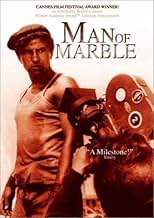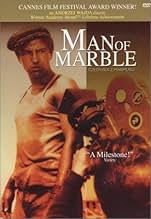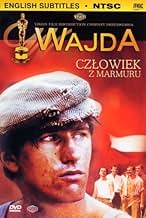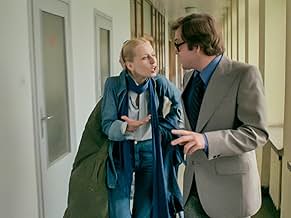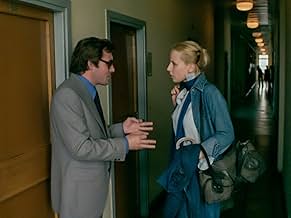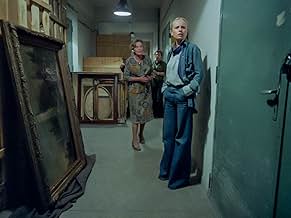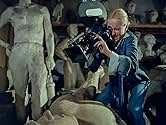CALIFICACIÓN DE IMDb
7.7/10
5.1 k
TU CALIFICACIÓN
Una estudiante de cine realiza una investigación con el objetivo de indagar en las causas del éxito y la caída de un obrero y líder sindical cuya carrera terminó de forma repentina.Una estudiante de cine realiza una investigación con el objetivo de indagar en las causas del éxito y la caída de un obrero y líder sindical cuya carrera terminó de forma repentina.Una estudiante de cine realiza una investigación con el objetivo de indagar en las causas del éxito y la caída de un obrero y líder sindical cuya carrera terminó de forma repentina.
- Dirección
- Guionista
- Elenco
- Premios
- 4 premios ganados y 1 nominación en total
- Dirección
- Guionista
- Todo el elenco y el equipo
- Producción, taquilla y más en IMDbPro
Opiniones destacadas
Ironic, tongue-in-cheek, smart and a tad too long, "Man of Marble" is a good movie that can't help being a little bit too much in love with itself, on top of being unable to know where to stop, thus ending being a little bit repetitive.
Agnieszka, a university student doing her diploma film, decides to investigate in the past of long forgotten hero of the people Birkut. Her search brings her to discover a lot about a man that was put in a pedestal to then be forgotten and erased from the history of the nation.
Wajda does not use a lot of subtlety in this film, but who needs it when the script is smart enough, the direction top notch, with some great shots and a pace that is sometimes close to an action movie, and there is really good acting (in particular our hero, Agnieszka, played with a lot of sass and confidence by Krystyna Janda). The score and the use of locations is also great.
However, the movie clocks at over two hours and a half, and the ideas behind the movie: the use of unknown people by the ones in power as little more than toys, destroying lives and dreams without a second of remorse, the difficulty to fight the system or the way paranoia extends everywhere in some regimes become undone by repetition and by a story that starts to spin on its wheels around the 1 hour and a half mark.
It is totally worth checking though. Just be sure to have enough time (you may want to have some breaks).
Agnieszka, a university student doing her diploma film, decides to investigate in the past of long forgotten hero of the people Birkut. Her search brings her to discover a lot about a man that was put in a pedestal to then be forgotten and erased from the history of the nation.
Wajda does not use a lot of subtlety in this film, but who needs it when the script is smart enough, the direction top notch, with some great shots and a pace that is sometimes close to an action movie, and there is really good acting (in particular our hero, Agnieszka, played with a lot of sass and confidence by Krystyna Janda). The score and the use of locations is also great.
However, the movie clocks at over two hours and a half, and the ideas behind the movie: the use of unknown people by the ones in power as little more than toys, destroying lives and dreams without a second of remorse, the difficulty to fight the system or the way paranoia extends everywhere in some regimes become undone by repetition and by a story that starts to spin on its wheels around the 1 hour and a half mark.
It is totally worth checking though. Just be sure to have enough time (you may want to have some breaks).
Andrzej Wajda has always impressed me, and his war trilogy are among the best and most essential films in the history of cinema, but "Man of Marble" is an ambitious, interesting idea that isn't realized very well in script or in terms of the finished product.
The most interesting aspect of "Man of Marble" outside of the much-examined similarities to "Citizen Kane" is how subversive it is. I wonder how this was ever released in Poland at the time, and the scenes in the film where I felt Wajda really did succeed as a director is where he contrasts Soviet propaganda with the actual events- very powerful. Wajda fails more than he succeeds with this particular film though, it's a disjointed narrative and it takes tremendous skill to keep the audience interested in both stories. Sure, one may argue that "Man of Marble" isn't intended as entertainment, but even in the context of art-house cinema this film is only engaging in parts, with Agnieszka's attempt to make this film ending up far more interesting than the film she's making.
I can see where Wajda is going with the way he shot this film, but it just doesn't work very well, and the score for this film has to be one of the worst matches I've ever come across. It's ludicrous.
Something of a companion piece by the same writer and director, I found "Man of Iron" far more engaging and impressive.
5/10
The most interesting aspect of "Man of Marble" outside of the much-examined similarities to "Citizen Kane" is how subversive it is. I wonder how this was ever released in Poland at the time, and the scenes in the film where I felt Wajda really did succeed as a director is where he contrasts Soviet propaganda with the actual events- very powerful. Wajda fails more than he succeeds with this particular film though, it's a disjointed narrative and it takes tremendous skill to keep the audience interested in both stories. Sure, one may argue that "Man of Marble" isn't intended as entertainment, but even in the context of art-house cinema this film is only engaging in parts, with Agnieszka's attempt to make this film ending up far more interesting than the film she's making.
I can see where Wajda is going with the way he shot this film, but it just doesn't work very well, and the score for this film has to be one of the worst matches I've ever come across. It's ludicrous.
Something of a companion piece by the same writer and director, I found "Man of Iron" far more engaging and impressive.
5/10
I came to this film after having watched Wajda's "Ashes and Diamonds," which I consider to be one of the finest films I have seen. However, "Man of Marble" was just too quirky for me, leaving me a bit perplexed.
The story concerns a young film student, known here only as Agnieszka, who decides to produce a documentary on one Mateusz Birkut as her graduation project. Birkut was an idealistic bricklayer who rose to the status of post-WWII hero by way of displaying superior efficiency and strength. His innovation of how to use a small team to accomplish improved production came to be so well recognized that he would tour the country setting up such teams. The film time-slices from the 1970s, when Agnieszka is making her film, to previous times, all the way back to mock documentary footage of Birkut in the 1950s. The presentation is anything but flattering to the Communist Party and it is astounding the Wajda was able to get this made in a time when the Communists were still in power in Poland. The story must be autobiographical to some extent, since we see Agnieszka encountering political opposition to her digging too deeply into the past trying to reconstruct Birkut's life and figure out why he essentially dropped from the scene after having been so highly visible; there is also a famous film director in the movie whom we get to know well.
There are many scenes that had the quality of a dream, but yet seemed like they were supposed to be taken for real. For example, one scene has Burkit's friend Witek going into a small office of a party boss and, when Burkit enters the office some time later there is no sign of Witek. If this were to be taken as some sort of Kafkaesque event, then Burkit would have made no remark on the mysterious disappearance, but he express the surprise that any normal person would have. I did not know what to make of such scenes. Agnieszka's facial expressions and body movements are often quite odd, bordering on the bizarre, and they accentuated the feeling of unreality I had that became increasingly more pronounced as the movie progressed.
The collage of Agnieszka's interviews, mock documentary footage, scenes from Burkit's life, scenes from Agnieszka's own life, and an inappropriate musical score did not coalesce for me.
The story concerns a young film student, known here only as Agnieszka, who decides to produce a documentary on one Mateusz Birkut as her graduation project. Birkut was an idealistic bricklayer who rose to the status of post-WWII hero by way of displaying superior efficiency and strength. His innovation of how to use a small team to accomplish improved production came to be so well recognized that he would tour the country setting up such teams. The film time-slices from the 1970s, when Agnieszka is making her film, to previous times, all the way back to mock documentary footage of Birkut in the 1950s. The presentation is anything but flattering to the Communist Party and it is astounding the Wajda was able to get this made in a time when the Communists were still in power in Poland. The story must be autobiographical to some extent, since we see Agnieszka encountering political opposition to her digging too deeply into the past trying to reconstruct Birkut's life and figure out why he essentially dropped from the scene after having been so highly visible; there is also a famous film director in the movie whom we get to know well.
There are many scenes that had the quality of a dream, but yet seemed like they were supposed to be taken for real. For example, one scene has Burkit's friend Witek going into a small office of a party boss and, when Burkit enters the office some time later there is no sign of Witek. If this were to be taken as some sort of Kafkaesque event, then Burkit would have made no remark on the mysterious disappearance, but he express the surprise that any normal person would have. I did not know what to make of such scenes. Agnieszka's facial expressions and body movements are often quite odd, bordering on the bizarre, and they accentuated the feeling of unreality I had that became increasingly more pronounced as the movie progressed.
The collage of Agnieszka's interviews, mock documentary footage, scenes from Burkit's life, scenes from Agnieszka's own life, and an inappropriate musical score did not coalesce for me.
'Man of marble' is usually seen as an bold, anti-communist movie which is strikingly accurate at the deep level of practices within communist countries. Indeed, trough a story of a student who tries to make a graduation film Wajda beautifully succeeds in describing at the same time the soft violence of the '70s in Poland and the totally different hardcore 'prison' violence of the Stalinist regime in the 50's. Hence, it is gradually revealed trough the eye of the camera the contrast between the heroic, raw atmosphere of the first communist years and the light perestroika of the present cinematographic time. Nonetheless, there is a common thread throughout the movie as the all-pervading party monopoly deeply affects everybody and no one has the option of an Utopian escape.
The no exit strategy is probably for me the main theme of the movie. The rebellious young girl who tries to see beneath the propaganda images is also on psychoanalytical trip to confront her family history.
There are two scenes which can more or less summaries the story: in the first one, we can see her right at the beginning in a rough quarrel with her Television supervisor, and we can consequently grasp the theme of the incessant conflict with the authority. However, if on the one level wecan see her rejecting the father figure, on the second level we can witness desire as the film maker is practically possessing the hero statue which she finds in a basement of a museum.
Well, basically the catch of the movie is the intertwine of the story with the girl on the way of her desire and the political level which makes this trip also a trip of a historical clearing up. And, in the strange development of we find that the "fake" hero is in fact an authentic one and that we did know the secret of the narrative - the "hero"(the father, the phallus) of the propaganda is the "true" hero, as he had to face real tough moral problems and he lived "the life in truth" . The heroine can develop at last real emotional attachment with the paternal image and she eventually can end her trip by accepting an ally and a friend in the final scene.
The no exit strategy is probably for me the main theme of the movie. The rebellious young girl who tries to see beneath the propaganda images is also on psychoanalytical trip to confront her family history.
There are two scenes which can more or less summaries the story: in the first one, we can see her right at the beginning in a rough quarrel with her Television supervisor, and we can consequently grasp the theme of the incessant conflict with the authority. However, if on the one level wecan see her rejecting the father figure, on the second level we can witness desire as the film maker is practically possessing the hero statue which she finds in a basement of a museum.
Well, basically the catch of the movie is the intertwine of the story with the girl on the way of her desire and the political level which makes this trip also a trip of a historical clearing up. And, in the strange development of we find that the "fake" hero is in fact an authentic one and that we did know the secret of the narrative - the "hero"(the father, the phallus) of the propaganda is the "true" hero, as he had to face real tough moral problems and he lived "the life in truth" . The heroine can develop at last real emotional attachment with the paternal image and she eventually can end her trip by accepting an ally and a friend in the final scene.
If 165 minutes seems like a long time to watch a film about a Polish bricklayer who becomes a symbol for over-achievement under the Soviet state, well, it probably is, but the film is not as dry as it might sound, and it's worth watching. Wajda adds an extra layer to the story by showing a young woman director (Krystyna Janda) using filmmaking in the 1970's as a means of uncovering the truth about what happened to this guy, and it's interesting when we see that filmmaking two decades earlier had been a means of creating his image. Just as with the communist statues and artwork from the era which show clean-cut, strong, contented workers, it was a director who came up with the idea for the bricklaying challenge in order to extol the virtues of the ideal worker under communism. Despite all this, the bricklayer (Jerzy Radziwilowicz) has an endearing innocence about him. He really wants to do a good job and to set a record, and later fights to try to find his buddy who has been imprisoned. He seems like a symbol of the Polish people of the period, and it's telling this his fate remains unknown and ambiguous for most of the film.
In poking at the so-called Stakhanovite worker, those who outperformed others but then faced resentment and backlash, Wajda deftly shows how it was all based on lies. He also shows a worker falsely imprisoned, the corruption of the state, and the soullessness of the Soviet-era construction projects ("what architecture," one muses), which is pretty impressive stuff to get produced in 1977, but then again, Wajda pushed boundaries throughout his career. I loved seeing the old archival footage of the actual construction of Nowa Huta and the anti-American propaganda, and I also loved the strength of Janda's character. She's a complete badass, striking her defiant poses in bell bottoms and set to 1970's funk/disco music. Wajda's filmmaking itself is a bit workmanlike but she helps bring it to life, and as with several of his other films, this seems essential as a document of Poland over the second half of the 20th century. I probably would have rated it higher in 1977, and even now debated a higher rating.
In poking at the so-called Stakhanovite worker, those who outperformed others but then faced resentment and backlash, Wajda deftly shows how it was all based on lies. He also shows a worker falsely imprisoned, the corruption of the state, and the soullessness of the Soviet-era construction projects ("what architecture," one muses), which is pretty impressive stuff to get produced in 1977, but then again, Wajda pushed boundaries throughout his career. I loved seeing the old archival footage of the actual construction of Nowa Huta and the anti-American propaganda, and I also loved the strength of Janda's character. She's a complete badass, striking her defiant poses in bell bottoms and set to 1970's funk/disco music. Wajda's filmmaking itself is a bit workmanlike but she helps bring it to life, and as with several of his other films, this seems essential as a document of Poland over the second half of the 20th century. I probably would have rated it higher in 1977, and even now debated a higher rating.
¿Sabías que…?
- TriviaThe award Burski is flaunting at the airport on his return was Wajda's own award, hence Burski is a mock self-portrait.
- ConexionesEdited into Sauve la vie (qui peut) (1981)
Selecciones populares
Inicia sesión para calificar y agrega a la lista de videos para obtener recomendaciones personalizadas
- How long is Man of Marble?Con tecnología de Alexa
Detalles
- Tiempo de ejecución
- 2h 45min(165 min)
- Color
- Mezcla de sonido
- Relación de aspecto
- 1.37 : 1
Contribuir a esta página
Sugiere una edición o agrega el contenido que falta


